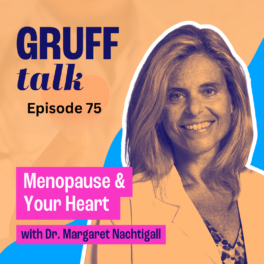Listen to the podcast by clicking HERE.
FACT: 1 in 9 perimenopausal and postmenopausal women in the 45-64 age group will develop heart disease. That’s a scary thought and one that may leave you wondering what you need to know about menopause and heart health.
Quick story: I was unprepared for the impact menopause had on my heart. I developed a non-life-threatening heart issue and vowed to never let heart disease be the cause of my premature demise. I ramped up my workouts and reassessed how I was managing stress, eating, and sleeping.
In this episode, Dr. Margaret Nachtigall walks us through the importance of heart health and its relation to menopause. We talk about modifying risk factors, as well as keeping an open mind about talking to your healthcare provider to see if estrogen therapy is right for you.
Dr. Nachtigall is a board-certified Reproductive Endocrinologist at NYU Langone Health. She is also the Medical Director of Menopause Cheat Sheet, a free newsletter we publish together to help women navigate life before, during, and after menopause
Modify Your Risk Factors
Although cardiovascular disease is a serious problem, there are actions you can take right now that are within your control. You can choose to eat healthier and get plenty of sleep. Exercise is also important to maintain a healthy heart. Dr. Nachtigall’s favorites are not smoking or drinking too much. One of the most important actions, which is often forgotten, is managing stress.
“… estrogen is not right for everyone, but it is right for many individuals.” – Dr. Margaret Nachtigall
Keep an Open Mind About Estrogen Therapy
Dr. Nachtigall points out that while starting estrogen early can have many health benefits, it isn’t right for everyone. It’s important to speak with your healthcare provider about your symptoms and risk factors to determine what’s best for you. Timing is critical if you consider starting estrogen. There are significant benefits to starting hormone therapy early on in menopause.
Dr. Margaret Nachtigall Takeaways:
- Try your best to reverse your risk factors
- Eat healthy and sleep well
- Discuss what your particular risks are for hormone therapy with your healthcare provider
“A lot of the symptoms that we attribute to menopause may also contribute to having an increase in heart disease.” -Dr. Nachtigall
Your healthcare provider will assess your risk factors and may do some testing. Risk factors may include abnormal lipid profiles. It’s also important to look at your cholesterol breakdown (total cholesterol, HDL, LDL). Other risk factors include obesity, smoking, stress, depression, inactivity, family history, inflammatory conditions, or chronic illnesses. Remember, estrogen may not be for everyone, but can provide benefits for many individuals.
LISTEN TO THE PODCAST HERE.
Connect with Dr. Nachtigall
Website: https://www.drnachtigall.com/
Sign up for our free monthly newsletter here:
Menopause Cheat Sheet: http://www.menopausecheatsheet.com/


